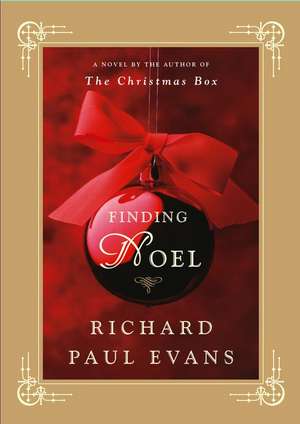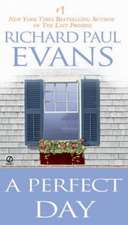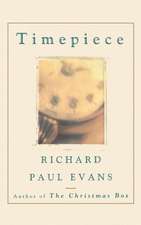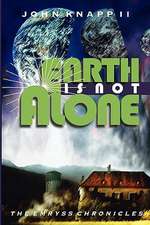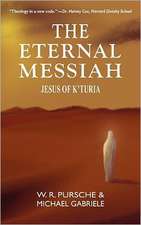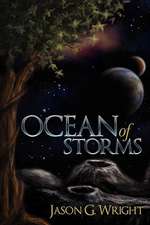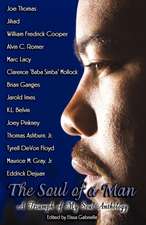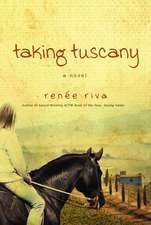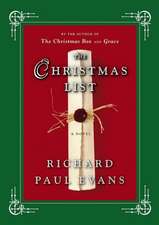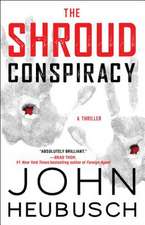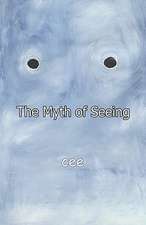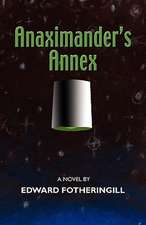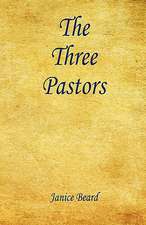Finding Noel
Autor Richard Paul Evansen Limba Engleză Hardback – 30 sep 2006
Finding Noel is about how people come into our lives for a reason. It is a love story about Macy and Mark, two young people from different worlds.
I'm sorry that this Christmas, for the first time since I became a writer, I won't be able to present my mother with a copy of my book. I think she would have enjoyed reading it. But, then again, I'm not certain that she hasn't.
As you read Finding Noel, I hope that you enjoy the journey and feel the same powerful emotions I felt as the story came to me.
Fondly,
Richard Evans
Preț: 109.67 lei
Nou
Puncte Express: 165
Preț estimativ în valută:
20.98€ • 21.91$ • 17.37£
20.98€ • 21.91$ • 17.37£
Carte disponibilă
Livrare economică 14-28 martie
Preluare comenzi: 021 569.72.76
Specificații
ISBN-13: 9780743287036
ISBN-10: 0743287037
Pagini: 304
Dimensiuni: 137 x 186 x 26 mm
Greutate: 0.33 kg
Editura: Simon&Schuster
ISBN-10: 0743287037
Pagini: 304
Dimensiuni: 137 x 186 x 26 mm
Greutate: 0.33 kg
Editura: Simon&Schuster
Extras
Chapter One
Begin at the start, end at the end.
It's the best advice I could give a friend.
* SONG LYRICS FROM MARK SMART'S DIARY *
When I was a boy, my mother told me that everyone comes into our lives for a reason. I'm not sure if I believe that's true. The thought of God weaving millions of lives together into a grand human tapestry seems a bit fatalistic to me. Still, as I look back at my life, there seem to be times when such divinity is apparent. None is more obvious to me than that winter evening when I met a beautiful young woman named Macy and there ensued the extraordinary chain of events that encounter set in place.
Of course such a theory carried to the extreme would mean that God sabotaged my car that night because, had my car's timing belt not broken at that precise moment, this story never would have happened. But it did, and my life was forever changed. Perhaps my mother was right. If God can align the planets, maybe He can do the same to our lives.
My story began at a time when it was dangerously close to ending -- a wintry November evening, eleven days after my mother died. My mother was killed in a car accident. There were three other people with her in the car, and everyone but my mother walked away unharmed. I was close to my mother, and the day I learned she died was the worst day of my life.
Even before her death my life was in shambles. I had left my home in Huntsville, Alabama, nine months earlier and come to Salt Lake City to attend the University of Utah on an engineering scholarship. I had never been out West, and all I knew of Utah (other than that it had the only out-of-state school willing to give me a scholarship) was that it was a long way from Huntsville, with a few mountain ranges in between. This suited me because I wanted to put as many miles between my father and me as I could.
Actually, I never really called Stuart Smart "Father." He had always been "Stu" to me, and I considered his full name an oxymoron. He was an auto mechanic with an eighth-grade education, grease under his fingernails, and a disdain for all things he didn't understand -- which included English grammar and me.
His dream was for me to one day take over the family business -- Smart Auto Repair -- and every Saturday after I turned ten, he'd drag me down to the garage and put me to work. While my friends were hanging around the Tastee-Freez or hunting grasshoppers with BB guns, I spent my childhood changing tires and air filters.
I hated everything about the garage; from the boredom of watching Stu dissect a transmission to eating bologna and mustard sandwiches on bread smudged with motor oil. But most of all I didn't like being with Stu. He wasn't one for idle conversation, so the long days were mostly silent except for the occasional whine of a pneumatic wrench and the constant twang of a country radio station. I wasn't much good as a mechanic and Stu always seemed annoyed with my ineptness. Every week I begged my mother to not make me go, and one Saturday, around the time I turned fourteen, Stu finally gave up on me and left me home.
If love isn't blind it's at least horribly nearsighted.
-- Mark Smart's Diary
My mother, Alice Geniel Phelps, was nothing like Stu. She was soft, well spoken and thoughtful. She liked to read and talk about philosophy, music and literature, things my father generally considered a waste of time. I could never figure out why someone like my mother married a guy like Stu until I came across a copy of my parents' wedding announcement. To my surprise I learned that they'd been married just eight weeks before I was born. I figured that with the way things were back then, she had to.
As I got older, Stu and I argued a lot. I couldn't tell you how many times my mother interceded on my behalf, sometimes standing between the two of us. My mother was the skin that held our home together. Now she was gone. And so was my home.
As I said, things were already going badly. Though I worked hard and earned straight A's, after my first year in school, the university announced a budgetary cutback and dropped hundreds of scholarships. Mine included. Since I was no longer in school, I lost my job at the university registrar's office and my room in the dorm.
In truth, I didn't care that much about engineering -- I had no real love for it -- but my parents couldn't afford tuition and the scholarship was my only way into college. My real dream was to be a songwriter. But music scholarships are hard to come by unless you're a classical virtuoso, which I'm not. I play the twelve-string guitar alright. I guess I'm more of a folksinger, not exactly Juilliard material.
Stu had predicted my failure and I wasn't about to give him the satisfaction of making him right, so I stayed in Utah and wrote cheerful, fraudulent letters home, telling everyone that school was going well. The truth was I was lonely, poor and depressed, living in a rundown basement apartment and employed at the only job I could find -- on the janitorial crew at a nearby high school.
My plan was to save up enough money to get back into school, but I was barely making enough to get by. The day my mother died, my aunt called the dorm to tell me. That's when my family learned I was no longer in school. Since I had left no forwarding address or phone number, I didn't find out about my mother's death until two days after her funeral when I called home to talk to her. Stu answered the phone. He called me a liar and told me not to bother to come home.
I thought I'd hit bottom, but apparently there was still more room to fall. Later that same week Tennys, my girlfriend back in Alabama, whom I had dated for nearly four years, sent me a letter informing me of her recent engagement to a promising young chiropractor.
I'm ashamed of what happened next. I now believe that under the right circumstances we are all capable of things we'd never think possible.
In the last year I had struggled with depression. But now, with the added grief, loneliness and rejection, I began having thoughts of ending my life. At first it was no more than an errant spark, quickly extinguished. But as my depression deepened, the idea began to take root.
The night this story begins I had arrived at work only to be yelled at by a crazy English teacher who accused me of stealing a classroom CD player. I knew nothing of the player, had never even noticed it, but she insisted that I was the only one with access to her room and she swore I'd be fired and reported to the police if I didn't return it by the next day. Later that evening, as I cleaned toilets, I decided this would be my last night of pain. That was where my mind was when my car broke down on the way home from work. God kicking me one last time, I thought. The truth was He had other plans.
My mother used to say, "Man's extremities are God's opportunities." She also used to say, "Be kind to everyone -- you don't know what cross they're bearing and how sweet that kind word might ring." That night proved both pieces of wisdom true.
That night was the start of a journey that taught me that one truth can change everything. It was the night I found Macy. And it was the Christmas season that Macy found Noel.
Copyright © 2006 by Richard Paul Evans
Begin at the start, end at the end.
It's the best advice I could give a friend.
* SONG LYRICS FROM MARK SMART'S DIARY *
When I was a boy, my mother told me that everyone comes into our lives for a reason. I'm not sure if I believe that's true. The thought of God weaving millions of lives together into a grand human tapestry seems a bit fatalistic to me. Still, as I look back at my life, there seem to be times when such divinity is apparent. None is more obvious to me than that winter evening when I met a beautiful young woman named Macy and there ensued the extraordinary chain of events that encounter set in place.
Of course such a theory carried to the extreme would mean that God sabotaged my car that night because, had my car's timing belt not broken at that precise moment, this story never would have happened. But it did, and my life was forever changed. Perhaps my mother was right. If God can align the planets, maybe He can do the same to our lives.
My story began at a time when it was dangerously close to ending -- a wintry November evening, eleven days after my mother died. My mother was killed in a car accident. There were three other people with her in the car, and everyone but my mother walked away unharmed. I was close to my mother, and the day I learned she died was the worst day of my life.
Even before her death my life was in shambles. I had left my home in Huntsville, Alabama, nine months earlier and come to Salt Lake City to attend the University of Utah on an engineering scholarship. I had never been out West, and all I knew of Utah (other than that it had the only out-of-state school willing to give me a scholarship) was that it was a long way from Huntsville, with a few mountain ranges in between. This suited me because I wanted to put as many miles between my father and me as I could.
Actually, I never really called Stuart Smart "Father." He had always been "Stu" to me, and I considered his full name an oxymoron. He was an auto mechanic with an eighth-grade education, grease under his fingernails, and a disdain for all things he didn't understand -- which included English grammar and me.
His dream was for me to one day take over the family business -- Smart Auto Repair -- and every Saturday after I turned ten, he'd drag me down to the garage and put me to work. While my friends were hanging around the Tastee-Freez or hunting grasshoppers with BB guns, I spent my childhood changing tires and air filters.
I hated everything about the garage; from the boredom of watching Stu dissect a transmission to eating bologna and mustard sandwiches on bread smudged with motor oil. But most of all I didn't like being with Stu. He wasn't one for idle conversation, so the long days were mostly silent except for the occasional whine of a pneumatic wrench and the constant twang of a country radio station. I wasn't much good as a mechanic and Stu always seemed annoyed with my ineptness. Every week I begged my mother to not make me go, and one Saturday, around the time I turned fourteen, Stu finally gave up on me and left me home.
If love isn't blind it's at least horribly nearsighted.
-- Mark Smart's Diary
My mother, Alice Geniel Phelps, was nothing like Stu. She was soft, well spoken and thoughtful. She liked to read and talk about philosophy, music and literature, things my father generally considered a waste of time. I could never figure out why someone like my mother married a guy like Stu until I came across a copy of my parents' wedding announcement. To my surprise I learned that they'd been married just eight weeks before I was born. I figured that with the way things were back then, she had to.
As I got older, Stu and I argued a lot. I couldn't tell you how many times my mother interceded on my behalf, sometimes standing between the two of us. My mother was the skin that held our home together. Now she was gone. And so was my home.
As I said, things were already going badly. Though I worked hard and earned straight A's, after my first year in school, the university announced a budgetary cutback and dropped hundreds of scholarships. Mine included. Since I was no longer in school, I lost my job at the university registrar's office and my room in the dorm.
In truth, I didn't care that much about engineering -- I had no real love for it -- but my parents couldn't afford tuition and the scholarship was my only way into college. My real dream was to be a songwriter. But music scholarships are hard to come by unless you're a classical virtuoso, which I'm not. I play the twelve-string guitar alright. I guess I'm more of a folksinger, not exactly Juilliard material.
Stu had predicted my failure and I wasn't about to give him the satisfaction of making him right, so I stayed in Utah and wrote cheerful, fraudulent letters home, telling everyone that school was going well. The truth was I was lonely, poor and depressed, living in a rundown basement apartment and employed at the only job I could find -- on the janitorial crew at a nearby high school.
My plan was to save up enough money to get back into school, but I was barely making enough to get by. The day my mother died, my aunt called the dorm to tell me. That's when my family learned I was no longer in school. Since I had left no forwarding address or phone number, I didn't find out about my mother's death until two days after her funeral when I called home to talk to her. Stu answered the phone. He called me a liar and told me not to bother to come home.
I thought I'd hit bottom, but apparently there was still more room to fall. Later that same week Tennys, my girlfriend back in Alabama, whom I had dated for nearly four years, sent me a letter informing me of her recent engagement to a promising young chiropractor.
I'm ashamed of what happened next. I now believe that under the right circumstances we are all capable of things we'd never think possible.
In the last year I had struggled with depression. But now, with the added grief, loneliness and rejection, I began having thoughts of ending my life. At first it was no more than an errant spark, quickly extinguished. But as my depression deepened, the idea began to take root.
The night this story begins I had arrived at work only to be yelled at by a crazy English teacher who accused me of stealing a classroom CD player. I knew nothing of the player, had never even noticed it, but she insisted that I was the only one with access to her room and she swore I'd be fired and reported to the police if I didn't return it by the next day. Later that evening, as I cleaned toilets, I decided this would be my last night of pain. That was where my mind was when my car broke down on the way home from work. God kicking me one last time, I thought. The truth was He had other plans.
My mother used to say, "Man's extremities are God's opportunities." She also used to say, "Be kind to everyone -- you don't know what cross they're bearing and how sweet that kind word might ring." That night proved both pieces of wisdom true.
That night was the start of a journey that taught me that one truth can change everything. It was the night I found Macy. And it was the Christmas season that Macy found Noel.
Copyright © 2006 by Richard Paul Evans
Descriere
The bestselling author of "The Christmas Box" brings the magic back to Christmas in his heartwarming new book.
